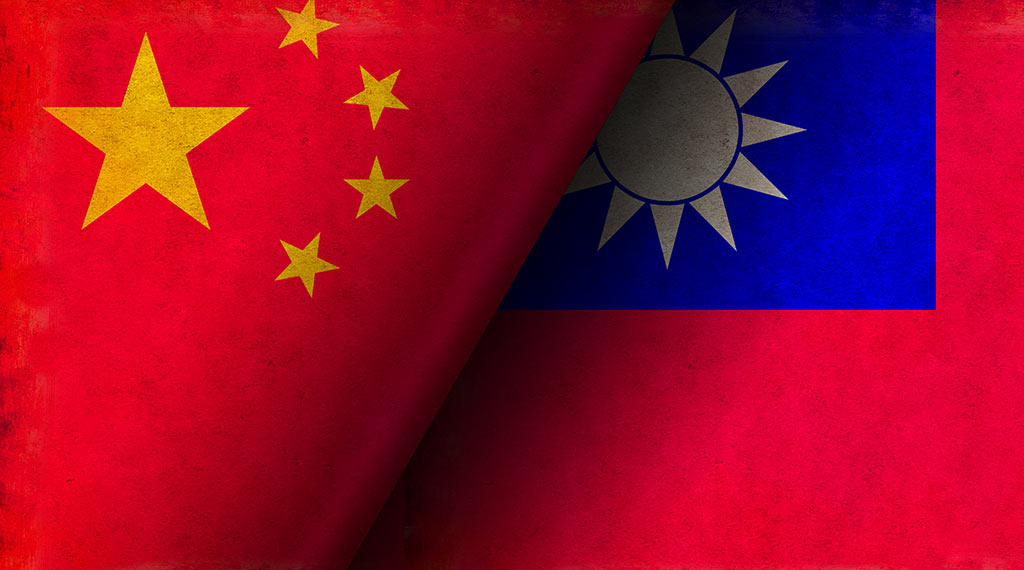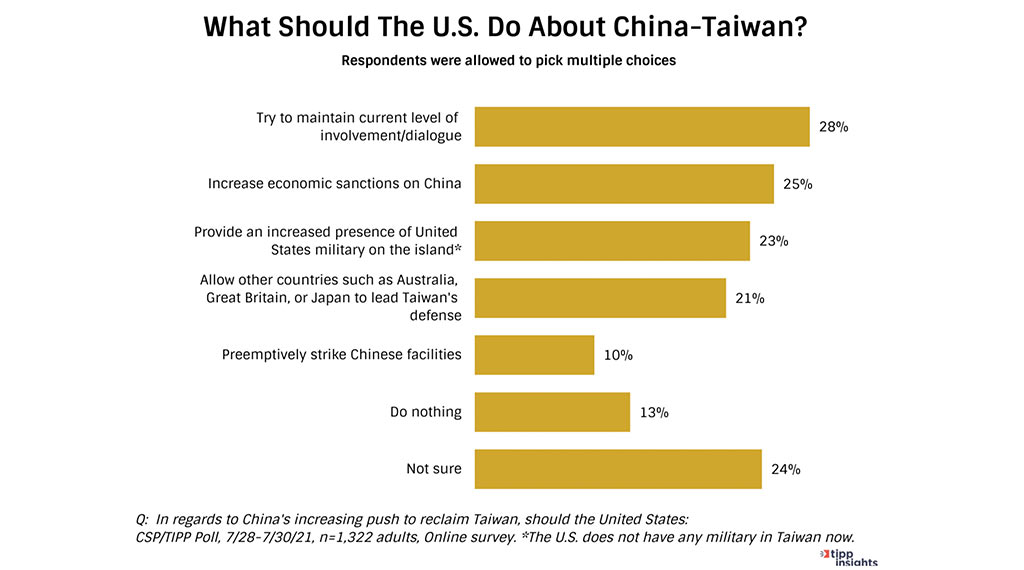Americans broadly favor active measures to counter China’s aggressive moves against Taiwan

Editor’s note: The Center for Security Policy gratefully acknowledges its collaboration with tippinsights on the simultaneous and exclusive release of this important story.
Opinions vary on strategy, but most agree that something must be done
In an August CSP/TIPP poll, 1,322 American adults were asked what they thought the United States should do in response to “China’s increasing push to reclaim Taiwan.” They were given several options and could select all that applied.
- 28% wanted to maintain the current level of involvement/dialogue
- 25% favored increasing economic sanctions on China
- 23% supported the increased presence of the United States military on the island*
- 21% wanted to allow other countries to lead Taiwan’s defense
- 10% supported a preemptive strike on Chinese facilities
- 13% chose “Do nothing”
- 24% were “Not sure”

Diplomacy, Dialogue, And Economic Pressure Were The Most Preferred Strategies
At 28%, maintaining current levels of involvement and dialogue was the most popular strategy, with increased economic sanctions on China being the second most preferred tool at 25%. Democrats were significantly more likely to favor engagement, with 34% of Democrats preferring to “maintain the current level of involvement/dialogue” vs. only 22% of Republicans. Yet simultaneously, Democrats were found to have exactly the same appetite for increased economic sanctions on China as Republicans, at 29%. Both Democrats and Republicans preferred peaceful approaches but apparently did not care whether those approaches were solely diplomatic or involved coercive measures that may potentially lead to a trade war.
Support for sanctions increased over 2.5x between the youngest 18-24-year-old age group (14%) and the older 65+ group (36%). This may be because the younger generation is just beginning to maximize their consumer potential and would be hit hardest by price increases on products such as the iPhone and other personal electronics. Retirees on a fixed income are more likely to have acquired most of the possessions they will ever own and so are perhaps less vulnerable to price fluctuations.
23% of respondents favored a substantial military presence in Taiwan. The U.S. military has not had an official footprint on the island since April 1979 but maintains nearly 90,000 personnel in Taiwan’s vicinity between Japan, South Korea, and the U.S. territory of Guam. America’s foreign policy gaze has slowly been shifting from the Atlantic to the Pacific, as first explicitly voiced in Barack Obama’s “pivot to Asia.” However, overall U.S. ship numbers have stalled while China increased its inventory by 55% between 2005 and 2019, leapfrogging into the lead with 335 ships.
While many of those Chinese vessels are smaller and less capable, the U.S. fleet is stretched throughout the world while China can focus on its home ports. A naval specialist at the Congressional Research Service, Ronald O’Rourke, commented:
While the United States today has more naval capability overall, China’s naval modernization effort has substantially reduced the U.S. advantage, and that if current U.S. and Chinese naval capability trend lines do not change, China might eventually draw even with or surpass the United States… In the South China Sea, some observers are concerned that China has already drawn even with or even surpassed the United States.
Nearly as many surveyed, 21%, said they wished to allow other countries to lead Taiwan’s defense. It is natural that Americans want allies in facing the most serious adversary of our time, but as in most theaters of potential conflict, the United States would have to provide the moral courage and logistical backbone behind any effective military response. The U.S. also lacks the communications channels required to coordinate effectively with its allies once hostilities break out.
In July, Japan stated openly and clearly that it would defend Taiwan against Chinese aggression.
Japan, the world’s third-largest economy, with a military considered the fifth strongest on earth and second only to China in East Asia, is situated just a few hundred miles off China’s east coast. The Japan Ground Self-Defense Force (JGSDF) was founded in the wake of World War Two as an explicitly defensive structure, but due to accelerating security threats from China and North Korea, as well as concerns that the U.S. security umbrella may falter, the JGSDF has upgraded offensive capabilities. In part due to the efforts of consultants like retired U.S. Marine Colonel Grant Newsham, the JGSDF has become a “more flexible, robust force capable of amphibious operations” and so more strategically relevant in a potential conflict with China.
The Japan-U.S. Security Treaty has guaranteed mutual defense for 70 years, yet this relationship has no practical mechanism or “situation room” to facilitate timely communication. Center for Security Policy Senior Fellow Stephen Bryen has recommended that the U.S. Department of Defense establish a Joint Military Command for the coordinated defense of Japan and Taiwan to remedy this problem.
Perhaps the most viable avenue for successful international collaboration is the Quadrilateral Security Dialogue (The Quad), consisting of the U.S., Japan, India, and Australia. While not an official alliance, it is implicitly an attempt to curtail Chinese military expansionism. The 2020 Malabar naval exercises saw the participation of all four countries, with U.S. Deputy Secretary of State Stephen Biegun stating that the Quad should be “more regularized” and, at some point, “formalized.” But at this time, there is no treaty tying these powers together, and even if an “Asian NATO” emerges, it would be just as dependent on U.S. power and initiative as the existing NATO.
Low Support For Preemptive Strikes And Low Probability Of Success
There was little support across the board for preemptive military strikes on China at 10%, but perhaps counterintuitively, support spiked significantly with Democrats (15% vs. 9% for Republicans), black and Hispanic Americans (14%), and those aged 25-44yo (17%). Investors (18%) and those with $75k+ income (17%) were also more likely than average to support strikes, perhaps because they feel they have more to lose from a gradual military and Chinese economic ascendancy.
The question of effective “shock and awe” strikes may be a moot point though. The U.S. Navy and Air Force still have domain over the larger Pacific, but China now possesses credible “standoff weapons” in the form of missiles that can deter U.S. carrier strike groups from operating in their coastal waters. Nearby air bases, like those on Okinawa and the main Japanese islands, would also come under missile attack in short order. Incoming fighter, bomber, and refueling sorties over the Chinese mainland would be vulnerable to anti-aircraft missiles and fighter interceptors.
In addition, China has such a vast array of military, industrial, and other strategic targets that it would be nearly impossible to make a meaningful dent in their capabilities with a preemptive strike. A great deal of damage could be done to Chinese facilities, but the costs of American men and equipment would be too high, and the ultimate strategic payoff would be too low for any administration to justify.
Unfortunately, these factors mean the United States and Taiwan must adopt a strong but primarily defensive posture, which is a difficult task. Not only must Taiwan credibly parry these conventional weapons threats, but they must also stand up to constant psychological “gray zone” attacks. For example, China has a history of sending fleets of hundreds of “fishing ships” towards Taiwan, Japan, and the disputed South China Sea. These fleets seek to provoke China’s adversaries into military action that can then be framed as an illegal attack on civilian vessels and a potential casus belli. More conventional and aggressive Chinese war exercises continue to escalate as well.
Investors And Those With The Highest Incomes Were Most Engaged
Wealthier Americans and investors were extremely activist and opinionated on this question. Only 6% of those making $75k+ and 6% of investors thought we should “do nothing,” and only 8% and 6% of those populations respectively were “not sure” about their stance.
Meanwhile, on the other side of the income gap, opinion was much more undecided and detached. 20% of those making under $30k and 17% of non-investors said we should “do nothing,” and strikingly, nearly a third of those making under $30k (31%) and non-investors (32%) said they were “not sure.”
Men were considerably more engaged than women, with only 21% of men saying they should “do nothing” or were “not sure,” while 53% of women indicated the same.
Conclusion
Americans are keenly aware of China’s geopolitical rise and its threat to the independence of Taiwan. They would prefer to resolve the situation through dialogue and coercive sanctions, and to the extent they favor military solutions, they would like to include a coalition of allies if possible.
China is not yet a peer competitor to the United States, but it wields unmatched economic and military power in its own backyard. Many medium and smaller powers in the region are threatened by China and are resolved to counter it, but can not take decisive action without U.S. leadership and will not risk everything if they are not convinced of our seriousness. This ability to trust the U.S. as a guarantor of stability and prosperity has been badly undercut by our disastrous pullout from Afghanistan, but it can be restored and strengthened in East Asia with improved avenues of inter-military communication and treaties with teeth, such as one based around The Quad relationship.
- Nearly half say coronavirus is man-made; 29% say it was intentionally released - February 17, 2022
- Americans back total boycott of Beijing Olympics under certain conditions - December 13, 2021
- Beijing pushes limits of authoritarian reach with latest celebrity “disappearance” - November 19, 2021
